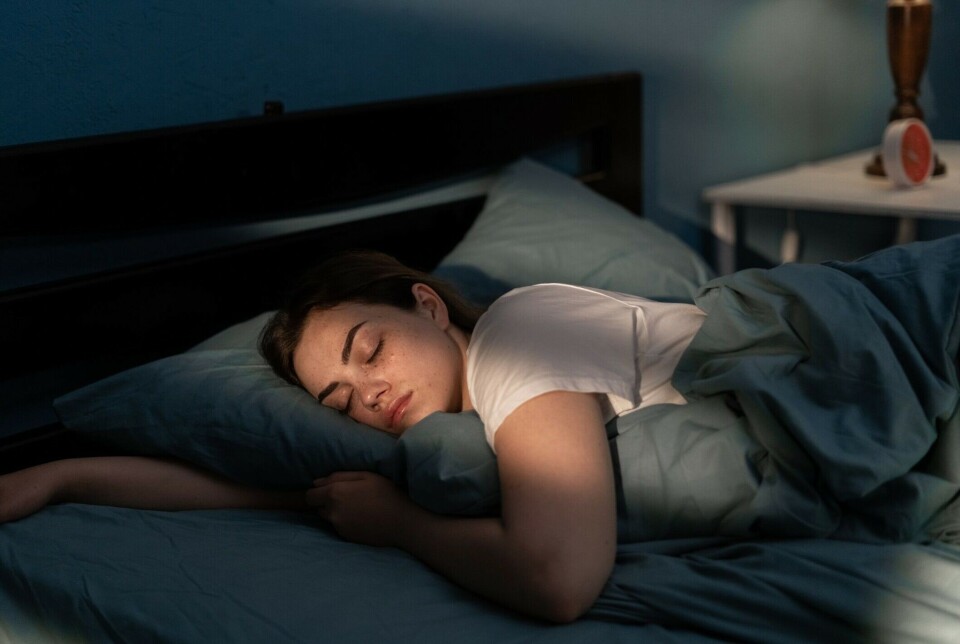THIS CONTENT IS BROUGHT TO YOU BY THE University of Agder - read more

20 years ago, it took around 17 minutes for teenagers to fall asleep once they got into bed. Today, it takes over an hour
Three quarters of Norwegian youth are not getting enough sleep. "It affects both school and leisure time," says researcher Erik Grasaas. He wants healthy sleep habits included in the school curriculum.
According to Norwegian sleep recommendations, teenagers are advised to sleep between eight and ten hours each night. A new study shows that only one in four follow this advice.
“We see that sleep and quality of life are connected for young people. Those who get the recommended amount of sleep tend to be more satisfied with their lives,” says researcher Erik Grasaas at the University of Agder.
To assess quality of life, participants were asked about various aspects of their current experiences, ranging from physical and mental health to family and social life.
“Even when we take into account factors such as stress, age, screen time, and socioeconomic status, we see that sleep duration is linked to life satisfaction, both for boys and girls,” he says.
60 per cent blame screens
Grasaas utilised Ungdata, a comprehensive national survey, to examine the sleep habits of more than 32,000 upper secondary school students. He found that:
- Three out of four get fewer than eight hours of sleep a night, regardless of gender.
- Three out of five say that they feel tired at school at least once or twice a week.
- Three out of five also report that screen time affects their sleep .
- Four out of ten boys say that gaming affects their sleep, while one out of ten girls report the same.

“About half of those who follow the sleep recommendations say they never feel tired during school or leisure activities. In contrast, only 30 per cent of those who don’t follow the recommendations say the same. That is a significant difference,” Grasaas says.
Weekend lie-ins do not help
20 years ago, it took around 17 minutes for teenagers to fall asleep once they got into bed. Today, it takes over an hour.
There could be various reasons for this change. One could be that young people are consuming too many caffeinated drinks late in the day. However, the researcher believes the change is related to phone use.
It could be because youth are bringing their phones to bed, but it could also be because they're using screens right up until bedtime.
“You shouldn't expose your eyes to intense light just before bedtime. A mobile phone is also much closer to your eyes than a TV screen,” he says.
Previous studies have shown that young people tend to sleep more on weekends than weekdays. Unfortunately, this does not appear to have a positive effect, the researcher notes.
“Many believe that they can make up for lost sleep on weekends, but we see that the sleep they get during weekdays is important for how they feel. We also know that going to bed and waking up at the same time every day is best,” he says.
Challenging teenage years
Sleep affects all bodily processes, from memory and learning to nervous system development and physical health. It also significantly influences energy levels during the day.
The researcher would like to see good sleep habits included in the school curriculum under the interdisciplinary subject of Public Health and Life Skills. This subject focuses on how to make informed health choices.
“Many factors in adolescence can make it difficult to get enough sleep. On the one hand, puberty brings major hormonal changes. On the other hand, there is less parental control, more caffeine intake and screen time, as well as pressure and stress both at school and during free time,” says Grasaas.
He believes that parents should help support good sleep habits but gives young people the primary responsibility.
“We must dare to hold young people accountable too, they are young adults after all. But they need health-promoting and evidence-based knowledge. Politicians and decision-makers play a critical role in ensuring this becomes firmly integrated into school curricula,” he says.
Knowledge can bring change
Screen time has been a recurring topic in the public debate about children and teenagers. Grasaas notes that many commercial entities benefit from prolonged screen use, and he thinks it is unlikely that this trend will decrease on its own.
However, he believes that increased knowledge can lead to change.
“We know that many young people are interested in their health, and today's culture emphasises performance. This should motivate them to prioritise sleep,” says Grasaas.
Reference:
Grasaas et al. Adherence to sleep recommendations is associated with higher satisfaction with life among Norwegian adolescents, BMC Public Health, vol. 24, 2024. DOI: 10.1186/s12889-024-18725-1
———
Read the Norwegian version of this article on forskning.no

This content is paid for and presented by the University of Agder
This content is created by the University of Agder's communication staff, who use this platform to communicate science and share results from research with the public. The University of Agder is one of more than 80 owners of ScienceNorway.no. Read more here.
More content from the University of Agder:
-
Fear being rejected: Half pay for gender-affirming surgery themselves
-
Study: "Young people take Paracetamol and Ibuprofen for anxiety, depression, and physical pain"
-
Research paved the way for better maths courses for multicultural student teachers
-
The law protects the students. What about the teachers?
-
This researcher has helped more economics students pass their maths exams
-
There are many cases of fathers and sons both reaching elite level in football. Why is that?




































